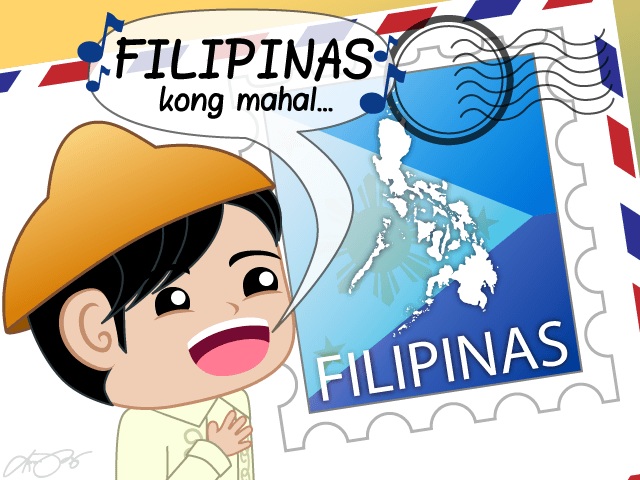Filtered By: Topstories
News
Switch to name 'Filipinas' unconstitutional, UP profs say
The Komisyon sa Wikang Filipino's recommendation to use "Filipinas" instead of "Pilipinas" goes against the 1987 Constitution, according to professors and institutions of the University of the Philippines.
"Matagal nang kinikilala na Pilipinas ang opisyal na pangalan ng ating bansa," read a statement issued after the Komisyon sa Wikang Filipino (KWF) called for the use Filipinas instead of Pilipinas.
According to KWF, the new term recognizes the country's history and development as a
According to KWF, the new term recognizes the country's history and development as a
nation. 

The UP professors argued that the move to use "Filipinas" had no legal basis. They noted that legal documents, such as passports, seals, and bills, show the country's official name as "Republika ng Pilipinas," followed by the English translation "Republic of the Philippines."
This was clarified in the deliberation of the 1986 Constitutional Commission, with Commissioner Wilfrido V. Villacorta saying, "Pilipinas is also the country's official name," noting that the entire Commission agreed on the matter.
Thus, the country is referred to as "Pilipinas" in the 1987 Constitution, both in its title as well as throughout the document.
"Hangga't hindi nababago ang pagtawag sa bansa bilang Republika ng Pilipinas, ito ang mananatili at kikilalaning opisyal na pangalan ng ating bayan," they wrote, adding that the country's official name was decided on after thorough discussions and the free exchange of ideas.
"Kolektibo itong nalikha, sinang-ayunan, at ipinatupad bilang pagkilala sa Republika ng Pilipinas na may demokrasya," the statement said.
The statement was signed by Dr. Rosario Torres-Yu, director of Sentro ng Wikang Filipino, Dr. Teresita G. Maceda, chair of the Department of Filipino and Philippine Literature, Dr. Maria Bernadette L. Abrera, chair of the Department of History, Dr. Aldrin P. Lee, chair of the Department of Linguistics, Dr. Vina P. Paz, coordinator of Larangan ng Wika, Dr. Ramon G. Guillermo, coordinator of Larangan ng Araling Pilipino, Dr. Pamela C. Constantino, member of the Commission on Higher Education Technical Committee on Filipino, and Dr. Jovy M. Peregrino, former director of Sentro ng Wikang Filipino.
The use of "Pilipinas" must also be seen in the context of the country's history, the statement said. The Philippines was first referred to as "Republica Filipina" in its declaration of independence because the Malolos Constitution was written in Spanish. However, "Pilipinas" was what Filipinos called their own country. Examples of this can be seen in Andres Bonifacio's "Katapusang Hibik ng Pilipinas" as well as in Emilio Aguinaldo's "Mga Gunita ng Himagsikan."
"Itong pag-aangkin natin sa dati'y banyagang pangalang 'Filipinas' tungo sa 'Pilipinas' ay nagpapakita sa paghubog natin ng bayan sa sarili nating identidad at katangian. Taglay natin sa ating makasaysayang paglalakbay tungo sa kalayaan ang pangalang 'Pilipinas,'" they wrote.
No linguistic basis
The move to replace "Pilipinas" with "Filipinas" had no linguistic basis, they also said. They agreed that while the inclusion of 'f' in the Filipino alphabet should be recognized, this is not enough reason to change "Pilipinas" to "Filipinas."
They said the rules of language will be useless if these contradict how the speakers think and speak.
"Walang saysay ang anumang patakarang pangwika kung ito ay sumasalungat sa kung ano ang nasa isip at ginagamit ng mga tagapagsalita nito. Kaya't mahalagang isaalang-alang ang likas na kaalaman at kasalukuyang gamit ng mga tagapagsalita nito sa anumang gagawing pagtatakda ng mga patakarang pangwika," they wrote.
"Walang saysay ang anumang patakarang pangwika kung ito ay sumasalungat sa kung ano ang nasa isip at ginagamit ng mga tagapagsalita nito. Kaya't mahalagang isaalang-alang ang likas na kaalaman at kasalukuyang gamit ng mga tagapagsalita nito sa anumang gagawing pagtatakda ng mga patakarang pangwika," they wrote.
They argued that changing the country's name from "Pilipinas" to "Filipinas" is not simply a matter of changing a letter. Rather, it is about identity and recognition.
"Kadikit ng identidad ng Pilipino ang 'Pilipinas' samantalang hindi kilala at kolonyal ang 'Filipinas.' Kaya, mahalagang maisaalang-alang ang sensitibong pagtingin sa pangkalahatang damdamin ng taumbayan upang mapag-isa ang bansa," they wrote.
"Kadikit ng identidad ng Pilipino ang 'Pilipinas' samantalang hindi kilala at kolonyal ang 'Filipinas.' Kaya, mahalagang maisaalang-alang ang sensitibong pagtingin sa pangkalahatang damdamin ng taumbayan upang mapag-isa ang bansa," they wrote.
Many Filipinos reacted negatively to the KWF proposal, with some pointing out that "Filipinas" is rooted in Spanish colonialism.
"Lahat ng umuunlad na bansa ay pasulong. Bakit tayo paurong gayong 'di na tayo sakop ng Espanya?" Dr. Lakandupil Garcia of the Pambansang Samahan ng Linggwistika at Literaturang Filipino said on GMA's TV show "Bawal ang Pasaway kay Mareng Winnie."
Meanwhile, the KWF proposal has yet to be discussed in Malacañang.
“We understand kasi ang Komisyon ng Wikang Filipino, ‘yun po ang mandato nila. So siyempre, they are just performing their mandate. Ito po ang kanilang recommendation but, as to official position taken by the Palace, we have not discussed it yet,” presidential spokesperson Edwin Lacierda said in an earlier report. —Carmela G. Lapeña/KG/HS, GMA News
Illustration by Analyn Perez
“We understand kasi ang Komisyon ng Wikang Filipino, ‘yun po ang mandato nila. So siyempre, they are just performing their mandate. Ito po ang kanilang recommendation but, as to official position taken by the Palace, we have not discussed it yet,” presidential spokesperson Edwin Lacierda said in an earlier report. —Carmela G. Lapeña/KG/HS, GMA News
Illustration by Analyn Perez
More Videos
Most Popular



